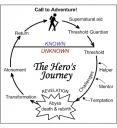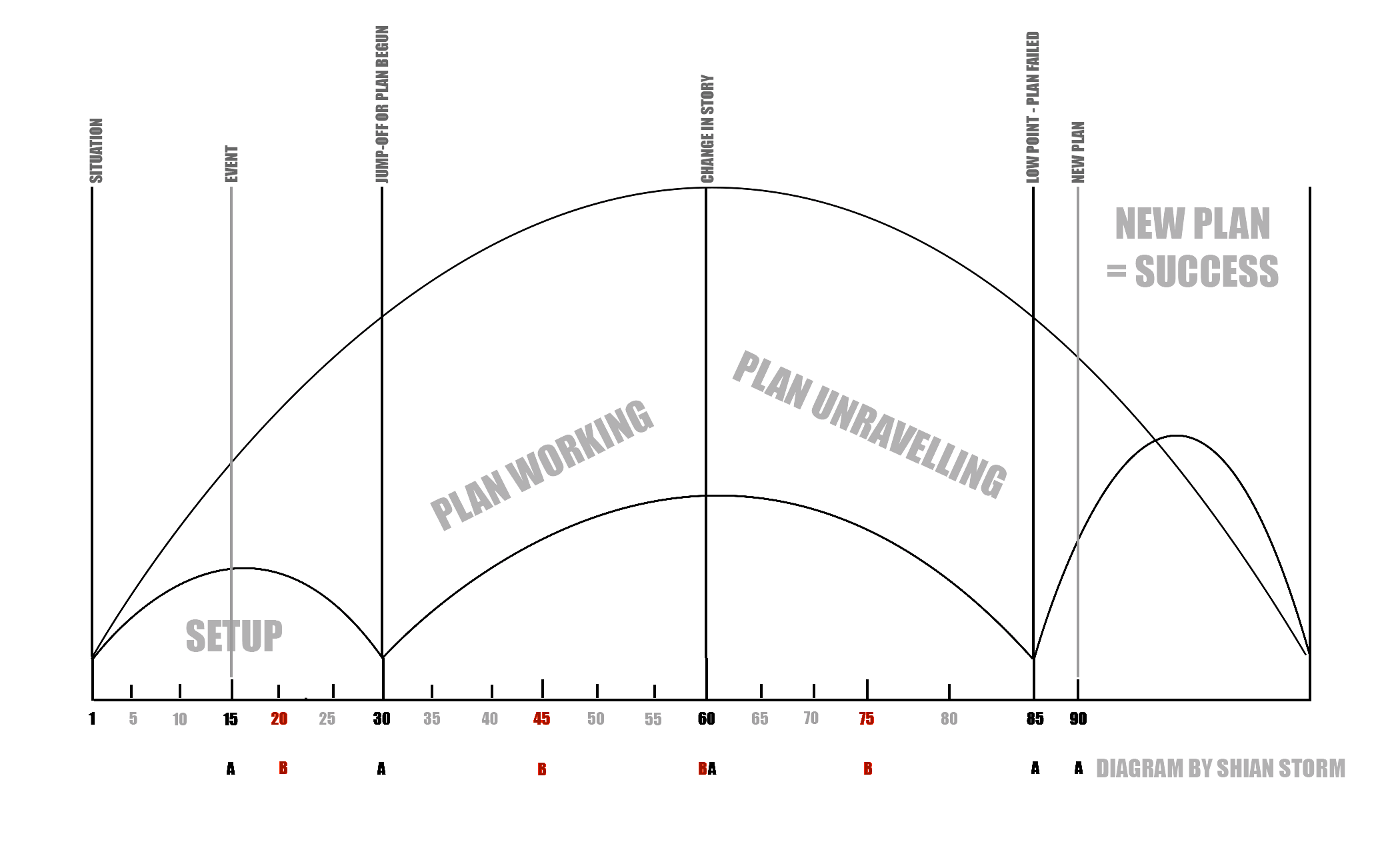
It allows to keep PV going, with more focus towards AI, but keeping be one of the few truly independent places.
-
Lets leave Big Cs making money and lets back to reality and to what we should really work on !
Before heroes come to the big screen in huge black rooms ,they were in stories as ancient as mankind. Depends on our country or culture of origin we learned about different Myths and religions. When you study these different myths and also the different religions of the world you find similarities. In a way most of heroes make the same journey.
Joseph Campbell,an american philosopher, has studied all this and bring us a nice theory : The monomyth. His work and books and derivative books are IMHO a must read for understanding the hero and the hero's journey ! This might be useful for those who are planning an epic movie and for Star Wars fans too :p Ofc this is not the only way to build a hero character and ofc Joseph Campbell work is not limited to the hero ,it's about mankind and unity...
http://en.wikipedia.org/wiki/Joseph_Campbell
An example of this thoughts
his main book(ofc i recommend others too) http://en.wikipedia.org/wiki/The_Hero_with_a_Thousand_Faces
http://www.amazon.com/Thousand-Faces-Collected-Joseph-Campbell/dp/1577315936
A book from tv docs http://en.wikipedia.org/wiki/The_Power_of_Myth
http://www.amazon.com/Power-Myth-Joseph-Campbell/dp/0385418868
A derivative book from his work http://en.wikipedia.org/wiki/The_Writer%27s_Journey:_Mythic_Structure_For_Writers
http://www.amazon.com/The-Writers-Journey-Structure-Edition/dp/193290736X
The hero's journey

 heros_journey.png350 x 382 - 21K
heros_journey.png350 x 382 - 21K -
I just read The Writer's Journey which has some pretty good stuff. It takes The Hero with a Thousand Faces and makes it more accessible and practical for modern screenwriting. It's different from other screenwriting books in that it details character archetypes (which were more or less useful). I've started to realize how often the mentor archetype gives a gift to the protagonist for him or her to use later. It's how James Bond gets all his cool shit!
-
The Hero's journey works, but the simplest way is to just learn the 3 Act structure in 4 parts. Easy Peasy.


 3ACT_story_arc.png2100 x 1278 - 164K
3ACT_story_arc.png2100 x 1278 - 164K -
I've found Snyder's 15 beats in his book Save the Cat to be incredibly useful as a more detailed and practical breakdown of the 3-act structure. A simple list of the beats is available on his site, but obviously for more in-depth descriptions of the beats and how they work, you'll have to buy the book.
-
Snyder has 3 books and a software. What do you need to buy ?
-
There is something to it.
Still for me a slavish 3 act structure with a time diagram a la Syd Field is the end of true art. It makes a movie a mathematic theorem. You cant push or press emotions in a corsett like that. A good story develops its own life, makes its own choices and decides how much room it needs.
Something like @shian 's diagram can in my opinion only be a first orientation if you are totally new to dramaturgy.
Luis Bunuel once invented a script machine (it was an ironic idea of him) to write movie stories just following those structures. A terrible caricature of a lot of Hollywood work. Like a machine without soul. This can of course work. Hollywood has worked on those standards for decades. The audience wants the same boring story told 1000 times, 10 years ago it was Jennifer Aniston, now its Mila Kundis who is the audiences darling for those roles. But no Bergman, Bunuel, Kurosawa, Bresson, Tarkovksy etc etc would work like that.
You dont have to be as drastic as Tarkovsky, abandoning classic dramaturgy and saying a poetic structure is the closest to life. But i think many of his ideas are true.
I read a book once that is based on Joseph Campbells theories. http://www.amazon.com/Soul-Screenwriting-Writing-Dramatic-Yourself/dp/082642869X
Its a nice book. Still, Hollywood has also used those structures for almost 4 decades now, especially after their success in Star Wars. After that everybody tried to make scripts like that, hoping to emulate the sucess.
In my opinion those structures are just a small assistance when you get stuck in the developement of a story.
-
Still for me a slavish 3 act structure with a time diagram a la Syd Field is the end of true art. It makes a movie a mathematic theorem. You cant push or press emotions in a corsett like that. A good story develops its own life, makes its own choices and decides how much room it needs.
I too find 3 act structure confining. But at the same time, lots of people work fluently within it. I don't think it's accurate to say it sucks the art out the literature. Too many people, too many films, prove that false. Other forms of art also have rules and guidelines that might feel stifling for some people, but others flourish in those structures.
-
I said that if you stick by it slavish it kills everything and i admitted it works for some :) I just think its wrong to asume that once you follow these steps you get a good story :)
-
"Every magic trick has Three Acts...." jokes have 3 acts, movies, etc... We are hard wired to process information BEST in 3 parts, and most of us move through life blissfully unaware of this. There are exceptions to this. Many great novels are told in 5-8 Acts, but are rarely processed in a single sitting. And they don't adapt particularly well, or remain true to their original content when made into movies.
Structure is not a rigid law, it is a basic framework in which you have the freedom to create whatever you wish, and guidelines to help make sure that the story you are telling will have the greatest impact. If structure alone could make a movie work, we wouldn't have so many shitty ones. It still has to be a GOOD STORY - TOLD WELL.
But you can expect that as an outsider, the moment you hand in a a script that doesn't conform to the standard structure, it won't matter how good you think it is, it will land in the trash. Once you are in the door and have a glowing track record, you can write "Black Swan" or "The Master" and it'll get made. It'll be a piece of shit, but the rules will no longer apply to you.
-
@shian: thats just partly true. I was working at a tv station that was producing or co-producing some of europes biggest arthouse cinema, for example the d'ardenne brothers who won in Cannes. We got like 10-20 scripts or exposees a day. Not all scripts were in 3 acts in a slavish manner.
Also, watch movies like tarkovskys "mirror" or bunuels phantom of the opera, kurosawas "rashomon", you wont find 3acts...
but i agree 90% of the movies are made after the 3 act principle...but the basic original principle of story telling is closer to the heros journey by campbell than the 3 acts principle.
And its also true, the more established you are, the more creative freedom you are granted. But if you write a super duper script that has nothing to do with 3 act structure it will get produced. A good reel or filmography certainly makes a lot of things easier. I saw someone like Christian Petzold who won the Berlinale this year just had to reach in a 2 paper rough cut or sketch and his stuff was produced...
Howdy, Stranger!
It looks like you're new here. If you want to get involved, click one of these buttons!
Categories
- Topics List23,992
- Blog5,725
- General and News1,354
- Hacks and Patches1,153
- ↳ Top Settings33
- ↳ Beginners256
- ↳ Archives402
- ↳ Hacks News and Development56
- Cameras2,367
- ↳ Panasonic995
- ↳ Canon118
- ↳ Sony156
- ↳ Nikon96
- ↳ Pentax and Samsung70
- ↳ Olympus and Fujifilm101
- ↳ Compacts and Camcorders300
- ↳ Smartphones for video97
- ↳ Pro Video Cameras191
- ↳ BlackMagic and other raw cameras116
- Skill1,960
- ↳ Business and distribution66
- ↳ Preparation, scripts and legal38
- ↳ Art149
- ↳ Import, Convert, Exporting291
- ↳ Editors191
- ↳ Effects and stunts115
- ↳ Color grading197
- ↳ Sound and Music280
- ↳ Lighting96
- ↳ Software and storage tips266
- Gear5,420
- ↳ Filters, Adapters, Matte boxes344
- ↳ Lenses1,582
- ↳ Follow focus and gears93
- ↳ Sound499
- ↳ Lighting gear314
- ↳ Camera movement230
- ↳ Gimbals and copters302
- ↳ Rigs and related stuff273
- ↳ Power solutions83
- ↳ Monitors and viewfinders340
- ↳ Tripods and fluid heads139
- ↳ Storage286
- ↳ Computers and studio gear560
- ↳ VR and 3D248
- Showcase1,859
- Marketplace2,834
- Offtopic1,320







